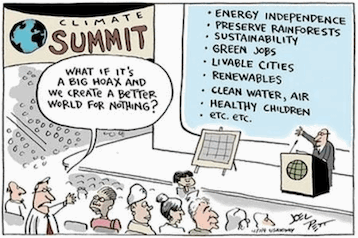Studies show that christians in the US and Australia are more likely than average to be sceptical about climate change. It appears that they think the scientific consensus is split between those who believe human-induced climate change is a major threat and those who think we just don’t know, and many suspect the scientists have ulterior motives.
How well based are these views?
The scientific consensus
Several studies have been made of scientists and scientific papers:
- James L. Powell, appointed by US Presidents Reagan and Bush to the National Science Board, reviewed almost 11 thousand peer-reviewed scientific papers published in 2013, and found only 2 that rejected anthropogenic global warming as a fact.
- NASA states that: “Ninety-seven percent of climate scientists agree that climate-warming trends over the past century are very likely due to human activities, and most of the leading scientific organizations worldwide have issued public statements endorsing this position.”
- The UN says: “Climate change is not a far-off problem. It is happening now and is having very real consequences on people’s lives.”
The christians who think there is no scientific consensus are mistaken. The scientists may have doubts and disagreements about some aspects of the predictions, but they are convinced climate change is happening and it is a threat.
The evidence
Here is just a brief list of references showing the evidence that our world is warming dangerously:
- My summaries of the evidence for climate change and a summary of the 2013 year.
- A summary of the scientific evidence for climate change by NASA.
- Reports of studies showing the current impacts of climate change around the world in Huffington Post.
- A summary of extreme weather conditions in the 2013/2014 summer in Australia, and how climate change is “baking” Australia, by the Climate Council.
- This YouTube video is an excellent summary of the evidence.
But global warming has halted, hasn’t it?
The last few years haven’t been much hotter than the few before that, so some sceptics say the world is no longer warming. But:
- The US National Oceanic and Atmospheric Administration reports that 2013 was the 37th consecutive year (since 1976) that the yearly global temperature was above average. The warmest year on record is 2010, and 9 of the 10 warmest years in the 134-year period of record have occurred in the 21st century. Only one year during the 20th century, 1998, was warmer than 2013.1
- One of the main factors affecting world climate is the El Nino weather pattern. In El Nino years, the world warms faster than in La Nina years – the past 60 years temperature graph shows a more or less cyclical pattern. La Nina has prevailed in recent years, but scientists predict El Nino patterns will resume soon – and with them a reversion to faster temperature rise.
- Much of the increased heat is currently being stored in the oceans, which makes the increase less apparent to us. But the oceans are heating up.
A global warming conspiracy?
Some christians, and others, allege that there is an anti-business conspiracy to promote global warming. I have looked at this allegation here and have found no evidence for it. Research shows that climate change sceptics are more likely than average to also believe other well-known conspiracy theories.
A big business conspiracy?
It seems more likely that there is a big business conspiracy against climate change. There is good evidence that climate change scepticism and obfuscation of the scientific facts is being funded and supported by those with the biggest investment in industries that produce greenhouse gases, or most idealogical commitment to reduce regulation by government.
It looks to many like the great tobacco industry hoax all over again. The tobacco industry knew for years that their products caused lung cancer, but denied this scientific and medical fact and fought against effective action for decades, thereby guaranteeing that millions more people died unnecessarily. This time it’s the carbon energy business, and their political supporters, especially the Murdoch press.
Don’t be fooled again!
I suggest we just have to ask ourselves: who has the greatest incentive to distort the truth – government organisations such as NASA and NOAA in the US, Australia’s prestigious CSIRO, and 97% of the world’s climate scientists, or the carbon energy business and the Murdoch press?
Why should christians care?
- We believe we are stewards of God’s earth and responsible to care for it. Thinking (like many have wrongly thought before) that we know Jesus will return soon, so it doesn’t matter, is not good stewardship.
- Some of the worst effects of climate change will be felt by some of the poorest nations that are not well-equipped to deal with the problems – e.g. reduced rainfall in already dry North Africa, increased storms and flooding in Bangladesh, soil erosion and damage to the water cycle in Nepal, salination of groundwater supplies and flooding in small island states. For this reason, christian aid organisations World Vision and TEAR advocate for action to address climate change.
- Climate change could have significant health impacts.
Christian organisations have been set up to advocate for climate change action – Operation Noah in the UK and Hope for Creation and the ARRCC in Australia.
What can be done?
The most important action to reduce the coming climate change is to greatly reduce usage of fossil fuels. This would have been almost impossible even a few years ago, but now technologies are available that allow the phasing out of fossil fuels in favour of renewable, and carbon-neutral, energy sources. It will take a concerted effort, but it could be done.
- Germany generates more than a quarter of its electricity from renewable sources, and plans to reach 80% by 2050.
- Renewable energy is now more than one eighth of total usage in the US.
- China, once considered backward in environmental action, is now leading the world in investment in renewable energy.
- Australia has an opportunity to begin to reduce power generation by fossil fuels.
- A carbon tax has been found to be an efficient way to combat climate change. Australia had a carbon tax, but it was removed after climate change sceptics misrepresented the facts.
- Electric cars are now becoming more effective and affordable.
Many organisations, including churches and now the influential Rockefellers are beginning to divest themselves of fossil fuel investments. Each of us can choose energy suppliers who provide “green power”, even if the cost is a little greater.
Will it cost the earth?

It is currently estimated that addressing climate change will cost somewhere between 2% and 4% of global GDP. The later we leave it, the more it will cost.
That isn’t an impossible figure – and it is also estimated that there will be similar costs if we do nothing.
Christians should be change agents
We are responsible to God for what we do to this planet and its inhabitants. We have higher values than simply making money and hoarding our wealth. Of all people, we should be willing to pay the cost of simplifying our lives and reducing our consumption to help the world and to help poorer nations and God’s people who live there.
The facts are clear enough, and becoming more clear and concerning every year.
Christians are positive change agents. Let’s be leaders in making this important change.
Note 1. The hottest 11 years on record are, in order: 2010, 2005, 1998, 2013, 2003, 2002, 2006, 2009, 2007, 2004, 2012.
Photo: MorgueFile. Cartoon: the Climate Institute.

Climate change genuinely terrifies me. The run of 25 plus degree days we have had here in Tassie recently has been so worrying, although most people are just elated by the warmth ( and yes, I am at the beach right now but may as well find the upside, hey?). Why do you think it is that evangelical Christians are tending often to be climate change deniers?
You do not do your credibility much good by quoting the ’97 percent’ myth. And let’s be clear. Most Christians believe in climate change. They just don’t all believe that the human factor has a big impact on natural cycles. Ane while hysterics obsess about CO2 and label an essential to life as a “pollutant,” action against real pollution suffers. That is not good stewardship.
Here is some perspective from one of the world’s leading (actual) climate scientists (a Jewish scientist whom many “Christian” fear mongers try to compare to a holocaust denier). https://www.youtube.com/watch?v=gJwayalLpYY
Hi Michael,
I have seen figures justifying the 97% figure (and the previous dot point gives evidence of more than 97%), but the exact number isn’t important. What’s important is that a reputable, and not particularly radical or “green” organisation like NASA makes the statement.
The references I quoted, and a few others show that large numbers of christians question the lot.
I have worked in pollution control, and no “real pollutant” presents as serious practical danger to the entire world as climate change.
The better parallel to climate denial is Jesus mythicism. In both cases, the vast majority of experts hold the contrary opinion, but you can always find someone to oppose the experts.
Thanks for taking an interest.
Hi Eva, I thought you were in Canberra, not Tassie. How did I get that so wrong??
I have wondered about why christians are more sceptical of climate science. I think it is a combination of several things”
1. Christians are likely to be conservative politically, and conservative politics tends to favour big business (and fossil fuels are big business!).
2. Christians who don’t accept evolution have learnt to be sceptical of any science that contradicts their assumptions.
3. Many christians have learnt to sit passively in church and be preached at and believe what the preacher says, so they tend to be conformists and believe what any authoritative-sounding person (e.g. shock jocks and Murdoch press) tells them.
4. Some christians believe Jesus is returning soon to take us away, so it doesn’t matter if we trash the earth.
I can’t see how that all fits with the radical Jesus and the renewal of the entire creation (Romans 8) and our dependence on science in almost every other part of life, and I believe the younger generation of christians is somewhat different. So I have hope.
Typically the members of western parliaments who propose stronger action against global warming also propose stronger pollution controls. Typically the same ideologies are to a similar degree supportive or opposed to both; we can expect significant correlation between those issues. So it is unlikely that attention for limiting CO2 emissions will reduce action against what you call real pollution. It is more likely it is a struggle between political camps.
I had not heard of Richard Lindzen, but if this is representative of his style of argumentation, that does not bode well: https://www.skepticalscience.com/skeptic_Richard_Lindzen.htm
Oddly, Evangelical Christians here have been relatively supporting of action against climate change. That environmentalist shift happened in the 80s.
Yes I agree that pollution controls and carbon reduction are likely to be supported by the same people, though some would support the more visible pollution controls but not climate change action. In Australia, 5 years ago, there was a fair consensus to act on climate change, but that isn’t as strong now, largely, I think, because of a strong, nasty and dishonest campaign by the Murdoch press.